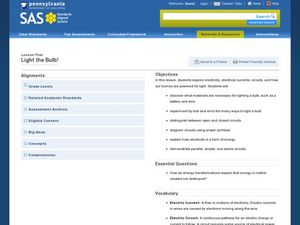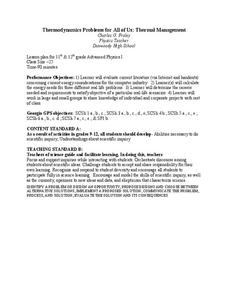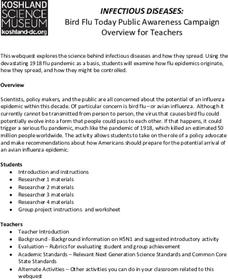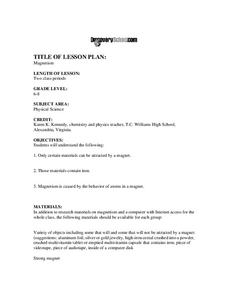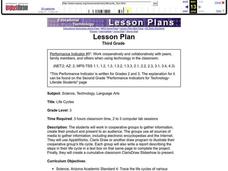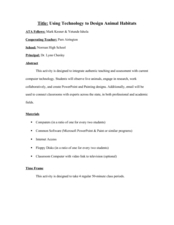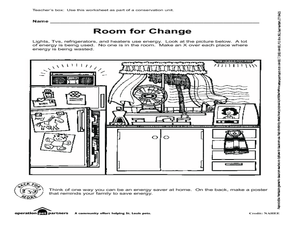Pennsylvania Department of Education
Light the Bulb!
Third graders investigate electrical circuits and how light bulbs are powered. In this electricity and power lesson, 3rd graders study the vocabulary necessary which includes the different types of circuits, electrical currents, and...
EngageNY
TASC Transition Curriculum: Workshop 9
Here's a workshop for teachers that rocks the academic world! Using earthquakes as a medium for instruction, educators learn about crosscutting engineering with science. Fun, hands-on, collaborative exercises encourage participants to...
Curated OER
Light the Bulb
Young scholars explore electricity. In this power experiment lesson, students determine what is required for lighting a bulb. Young scholars develop an understanding of open and closed circuits, and how energy is formed
Curated OER
Electricity and Magnetism: Ben Franklin and His Influence
Fourth graders explore electricity by examining the life of Benjamin Franklin. In this biographical lesson, 4th graders listen to the teacher read facts of Benjamin Franklin's life and analyze his contributions to our current...
Curated OER
Scientific Method in Action
High schoolers investigate the current environmental movement by cleaning up their own campus. In this environmental care lesson, students practice cleaning their "environment" by picking up trash on their campus and decrease...
Scholastic
Recovery From Drug Addiction
Are there factors that put some individuals at a higher risk for drug addiction than others? Learn more about the risk factors that may make some people more susceptible to addiction, as well as protective factors that help prevent...
Curated OER
Mars Mission Logbooks
Learners design and create a logbook into which a variety of data is kept to document and assess their involvement in the Live From Mars module. Academic progress is tracked as materials are added to he portfolio.
Curated OER
Velocity and Acceleration
Twelfth graders look at local speed limits and traffic controls and see if they are reasonable. They plot the displacement and time to represent velocity, develop a plan for improving the current system, and organize experimental...
Curated OER
Thermodynamics Problems for All of Us: Thermal Management
Young scholars evaluate current literature on the Internet and in handouts about the energy considerations for the computer industry and calculate energy needs for real life problems. Working in groups, they present the problem they...
National Academy of Sciences
Infectious Diseases: Bird Flu Today
Understanding how viruses spread has never been more important. A well-designed WebQuest lesson has young scientists research viruses, how they spread, and how they are treated. They also consider the trends in common viruses in the world.
Curated OER
Top Quark Lab
Students find the mass of the top quark. In this physics instructional activity, students create a vector diagram from a given set of data. They discuss their calculations and findings in class.
Curated OER
The "Science" of Racism
How can we keep racism out of our society? Analyze the factors that lead to racism today and research previous scientific findings that impacted social policy. Your high school students identify ways to prevent past mistakes from...
Curated OER
WHAT MAKES A LIGHT BULB LIGHT?
Students are able to use inquiry to answer the essential questions. They are able to predict and test configurations of a battery, bulb, and wire that make the complete circuit. Students craft a group and individual theory of a...
Curated OER
Magnetism
Students experiment with the concept of magnetism. Working in small groups, students design an experiment to test the magnet attraction of various substances. After completing their experiments, students research magnetism and it's...
Curated OER
LIFE CYCLES
Third graders work in cooperative groups to gather information, create their product and present to an audience. The groups use all sources of media to gather information, including electronic encyclopedias and the Internet. They use...
Curated OER
One of These Things is Not Like the Other
Students examine sets of four or five organisms and determine which organism in each set doesn't "belong", and determine a variety of characteristics that explain why it doesn't belong.
Curated OER
Not in my Back Yard!
Students explore the concept of a mock town council meeting. In this mock town council meeting, students are divided into homeowners, developers, environmentalists, supporters, and those opposed to a new shopping mall. Students discuss...
Curated OER
Where Do I Belong?
Tenth graders study the diversity of life in the world. They classify and sketch organisms into the 6 kingdoms.
Curated OER
Physical Science: Magnetism and Electricity
Students use a variety of objects to test for ability to "stick" to a magnet. They perform an experiment to see that electricity in circuits can produce light, heat, sound, and magnetic effects. They discover magnets attract and repel...
Curated OER
Using Technology to Design Animal Habitats
Students study the relationship between an animal and where it lives. In this habitats lesson students research to obtain data and create a professional report.
Curated OER
Save the Earth, it's Everyone's Home!
Students examine trash for items to recycle and reuse. In this trash lesson, students explore how people in the community can use recycled and reused items as they play a recycling game.
Curated OER
The Physics of Sound: How We Produce Sounds
First graders construct a KWL chart on sound. In this physics lesson, 1st graders describe different ways to produce sound. They explain how sound waves propagate.
Curated OER
Pendulum Lab
Learners predict how changing the pendulum components affect its period. In this physics instructional activity, students calculate the period using different masses. They analyze lab result and complete assigned worksheet.
Curated OER
Deep Sea Fishing for Facts
Third graders read each question and click on the Web link located next to it. They find the answer to the question and type in their answer below the questions. When finished, they print off their page and turn it in.
